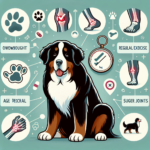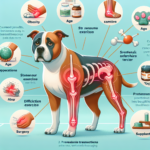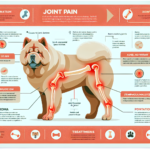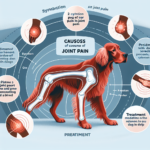Bernese Mountain Dog Joint Pain: Causes, Symptoms, Prevention, and Treatment

Introduction
The Bernese Mountain Dog, affectionately known as the “Berner,” is a large, sturdy breed originating from the Swiss Alps. Historically, these dogs were used as farm dogs, adept at pulling carts, herding cattle, and serving as loyal companions. With their striking tricolor coats, gentle temperament, and strong build, Bernese Mountain Dogs have become beloved family pets worldwide.
Despite their many admirable qualities, Bernese Mountain Dogs are prone to several health issues, with joint pain being a significant concern. Understanding the causes, symptoms, prevention, and treatment of joint pain in Berners is crucial for ensuring their long-term health and well-being.
Joint health is particularly important for Bernese Mountain Dogs due to their large size and active nature. Proper joint care can help prevent debilitating conditions that can severely impact their quality of life.
Breed-Specific Joint Pain Risks
Genetic Predisposition
Bernese Mountain Dogs are genetically predisposed to several joint-related issues, including hip dysplasia, elbow dysplasia, and arthritis. Hip dysplasia occurs when the hip joint does not fit properly into the hip socket, leading to pain and mobility issues. Elbow dysplasia involves abnormal development of the elbow joint, causing lameness and discomfort. Arthritis, a degenerative joint disease, can also develop as a result of these conditions or due to general wear and tear over time.
Age-Related Risks
As Bernese Mountain Dogs age, the risk of joint pain increases. Typically, signs of joint issues may start to appear around middle age, which for Berners is between 4 to 7 years old. However, some dogs may show symptoms earlier, especially if they have a genetic predisposition or have experienced joint injuries.
Activity Level and Joint Stress
Bernese Mountain Dogs are known for their high energy levels and love for physical activities such as running, hiking, and playing. While regular exercise is essential for their overall health, excessive or high-impact activities can put additional stress on their joints, potentially leading to joint pain and injuries.
Common Symptoms of Joint Pain in Bernese Mountain Dogs
General Symptoms
- Limping or favoring one leg
- Stiffness, especially after rest or sleep
- Reluctance to move, jump, or climb stairs
- Decreased activity level or interest in play
- Swelling or heat around the joints
- Whining or showing signs of discomfort when touched
Breed-Specific Symptoms
In Bernese Mountain Dogs, joint pain may manifest more noticeably due to their size and weight. Owners may observe a pronounced limp or difficulty getting up from a lying position. Additionally, Berners may become more sedentary and less enthusiastic about activities they once enjoyed.
When to Consult a Vet
If you notice any of the above symptoms in your Bernese Mountain Dog, it is essential to consult a veterinarian promptly. Early diagnosis and intervention can help manage joint pain more effectively and prevent further deterioration.
Preventive Measures for Joint Health
Exercise Recommendations
Regular, moderate exercise is crucial for maintaining joint health in Bernese Mountain Dogs. Activities such as walking, swimming, and gentle play are ideal. Avoid high-impact exercises like jumping or running on hard surfaces, which can exacerbate joint stress. Aim for consistent, low-impact activities that keep your dog active without overloading their joints.
Dietary Suggestions
A balanced diet rich in essential nutrients can support joint health. Consider incorporating foods or supplements that contain glucosamine, chondroitin, and omega-3 fatty acids, which are known to promote joint health and reduce inflammation. Consult your veterinarian for specific dietary recommendations tailored to your dog’s needs.
Weight Management
Maintaining a healthy weight is critical for reducing joint stress in Bernese Mountain Dogs. Excess weight can exacerbate joint pain and lead to other health issues. Monitor your dog’s weight regularly and adjust their diet and exercise routine as needed to keep them at an optimal weight.
Early Screening and Monitoring
Regular veterinary check-ups and early screening for joint issues can help catch problems before they become severe. Your veterinarian may recommend specific tests, such as X-rays or joint fluid analysis, to assess your dog’s joint health. Early intervention can significantly improve outcomes and quality of life.
Treatment Options for Joint Pain
Non-Surgical Treatments
Non-surgical treatments for joint pain in Bernese Mountain Dogs include medications, physical therapy, and lifestyle adjustments. Anti-inflammatory drugs and pain relievers can help manage symptoms, while physical therapy can improve mobility and strengthen muscles around the joints. Lifestyle adjustments, such as providing a comfortable bed and avoiding strenuous activities, can also alleviate joint pain.
Surgical Options
In severe cases, surgical intervention may be necessary. Common surgical options for joint pain include hip replacement, elbow arthroscopy, and joint fusion. These procedures can significantly improve mobility and reduce pain, but they come with risks and require a thorough discussion with your veterinarian.
Alternative Therapies
Alternative treatments such as acupuncture, hydrotherapy, and massage can also benefit Bernese Mountain Dogs with joint pain. Acupuncture can help reduce pain and inflammation, while hydrotherapy provides low-impact exercise that strengthens muscles without stressing the joints. Massage therapy can improve circulation and alleviate muscle tension around the joints.
Lifestyle and Management Tips
Daily Care Routine
A consistent daily care routine can help manage joint pain in Bernese Mountain Dogs. This routine might include gentle exercise, a balanced diet, and regular administration of any prescribed medications or supplements. Providing a comfortable resting area and avoiding activities that strain the joints are also essential components of daily care.
Modifying the Home Environment
Making your home more comfortable for a dog with joint pain can significantly improve their quality of life. Consider using ramps instead of stairs, providing orthopedic beds, and ensuring that food and water bowls are at a comfortable height. These modifications can reduce joint strain and make daily activities easier for your dog.
Long-Term Management
Long-term management of joint pain involves ongoing monitoring and adjustments to your dog’s care routine. Regular veterinary check-ups, weight management, and appropriate exercise are crucial. Additionally, staying informed about new treatments and therapies can help you provide the best care for your Bernese Mountain Dog.
FAQs About Bernese Mountain Dogs and Joint Pain
What are the early signs of joint pain in Bernese Mountain Dogs?
Early signs of joint pain include limping, stiffness, reluctance to move, and decreased activity levels. If you notice these symptoms, consult your veterinarian for a thorough evaluation.
Can joint pain in Bernese Mountain Dogs be prevented?
While genetic predispositions cannot be entirely prevented, maintaining a healthy weight, providing appropriate exercise, and regular veterinary check-ups can help reduce the risk and severity of joint pain.
Are there specific diets that can help with joint health?
Yes, diets rich in glucosamine, chondroitin, and omega-3 fatty acids can support joint health. Consult your veterinarian for specific dietary recommendations tailored to your dog’s needs.
When should I consider surgery for my dog’s joint pain?
Surgery is typically considered when non-surgical treatments are no longer effective, and the dog’s quality of life is significantly impacted. Discuss the risks and benefits with your veterinarian to make an informed decision.
What alternative therapies are available for joint pain?
Alternative therapies such as acupuncture, hydrotherapy, and massage can provide additional relief for joint pain. These treatments can be used alongside conventional methods to improve your dog’s comfort and mobility.
Conclusion
Joint pain is a common concern for Bernese Mountain Dogs, but with proper care and attention, it can be managed effectively. Understanding the causes, symptoms, prevention, and treatment options is crucial for ensuring your dog’s long-term health and well-being. By taking preventive measures, consulting your veterinarian regularly, and staying informed about new treatments, you can help your Bernese Mountain Dog live a happy, active life despite joint pain.




